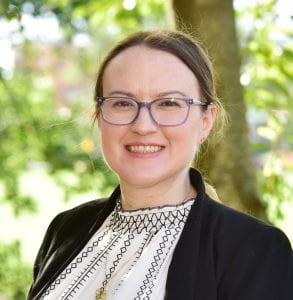
Katrina Groth Associate Professor Director of the SyRRA Lab
Katrina M. Groth is an Associate Professor of Mechanical Engineering and the Director of the Reliability Engineering program at the University of Maryland. Groth specializes in safety, risk, and reliability analysis of energy systems. She has an active portfolio of research, including developing of Quantitative Risk Assessment methods to provide insights into dominant failure causes in novel hydrogen technologies, investigating prognostics and health management (PHM) techniques to support reliability monitoring and diagnosis of complex systems, and creating reliability data collection frameworks and algorithms. Her work has influenced safety practices and codes and standards for hydrogen fueling stations, hydrogen storage and electrolyzers, fuel cell forklifts, gas pipelines, nuclear power plants, and more. She invented the DOE’s HyRAM toolkit for hydrogen risk assessment, which is used by engineers worldwide to inform hydrogen safety, codes, and standards, including NFPA 2 and ISO 19880-1. Her work has been cited over 4,000 times and she has been recognized with numerous awards including an NSF CAREER award, a DOE Hydrogen Program R&D Award, the David Okrent Award for Nuclear Safety, and the Landis Young Member Engineering Achievement award.
Prior to joining UMD, Groth served as Principal R&D Engineer at Sandia National Laboratories, where she led multiple projects in probabilistic risk assessment, human reliability analysis and hydrogen safety, codes, and standards. Groth developed HyRAM (hyram.sandia.gov), a risk assessment and consequence analysis framework for hydrogen infrastructure, designed to put the state-of-the-art in hydrogen safety science into the hands of codes and standards developers. HyRAM integrates analytical models, experimental data, historical data, simulations, and techniques from risk assessment, fire science, and fluid dynamics. HyRAM was a critical tool in enabling harmonization of requirements beween the United States and international safety standards for hydrogen fueling stations (NFPA 2 and ISO 19880-1) and continues to be used today in the development of safe hydrogen technologues.
Groth has published over 175 papers and archival technical reports, created multiple software packages, and holds 2 patents. Her work has received funding from the U.S. Department of Energy (DOE), the U.S. Nuclear Regulatory Commission (NRC), the U.S. Pipeline and Hazardous Materials Safety Administration (PHMSA), the National Science Foundation (NSF), NASA, the Electric Power Research Institute (EPRI), GTI Energy (formerly Gas Technology Institute), and national laboratories (including Sandia National Laboratories, the National Renewable Energy Laboratory, Idaho National Laboratory, and the German Federal Institute for Materials Research and Testing (BAM; Bundesanstalt für Materialforschung und -prüfung)), and private industry.
Groth is an active and engaged educator, and committed mentor for all of her students, and an advocate for women and minorities in engineering. Groth is also a trustee for the National Museum of Nuclear Science & History in Albuquerque, NM. She brings a combination of passion and deep real-world experience to her classes, and believes that risk assessment needs to be in every engineer’s toolbox.
Location: 0151.B Glenn L. Martin Hall, University of Maryland, College Park, MD 20742.
